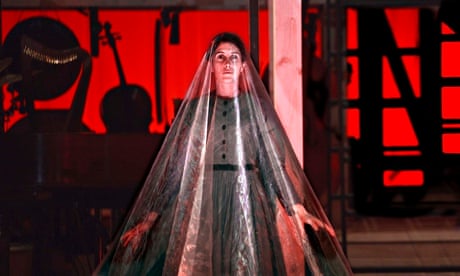Over the weekend I was in Bristol watching Sally Cookson's marvellously textured devised version of Jane Eyre at the Old Vic. It might be the 19th-century title that's getting audiences into the building, but once they are there they will be watching a piece that uses all the tools of 21st-century theatre. It is a show that is a million miles away from the literal and literary adaptations that were part of my youthful theatregoing.
Like Melly Still's Coram Boy, Dennis Kelly and Tim Minchin's Matilda, Simon Stephens and Marianne Elliott's The Curious Incident of the Dog in the Night Time, and Tom Frankland and Keir Cooper's Don Quijote (which actually takes a hacksaw to Cervantes's book), the Bristol Jane Eyre is a page-to-stage theatre experience that leaves the original book far behind. These shows are as different as they are similar to the source material that inspired them.
Yet there often remains a feeling that the adaptation must always be second best. Reviewing Duncan Macmillan and Robert Icke's extraordinary take on 1984 at the Almeida, my colleague Michael Billington praised its fierce intelligence but was concerned that it was part of a worrying trend in which theatre was "rapidly becoming a place of dramatisation rather than original drama".
The key words here may be dramatisation and drama. Many of the theatremakers who are making these shows are probably not all that concerned about making drama, but are very interested in all the possibilities of theatre, and they work magpie-like across many different art forms and platforms. It shows. Jane Eyre in Bristol is definitely not a musical, but Benji Bower's fabulous score – which has its own magpie tendencies as it melds old and new – ensures that this show and its meanings are experienced as much through its soundscape as it is through its visuals and, in particular, its text. Text is only a very small part of the experience, unlike the stage adaptations of old, which were often merely an attempt to provide a substitute for the novel. A sort of animated version of Spark Notes, and very dull with it.
Of course, I understand Michael's concern, and he is right to worry, particularly at a time of funding cuts, that theatres don't turn their backs on plays and playwrights. As the In Battalions report and Delphi study demonstrates, plays are under threat. But the idea that new writing is merely the single-author play is changing fast. Many writers and theatremakers are collaborating and are questioning what theatre can and might be and how it is produced, and are prodding at the boundaries between designated roles.
Productions such as 1984 and Jane Eyre may have been created using many different tools, and may see text as just one of those tools, but the fact that they draw on old sources to create new work doesn't mean that they are of less value or less thrilling as pieces of theatre than an original piece of drama.
If these adaptations of familiar titles were being staged only as a means of ensuring good box-office returns, it would indeed be a concern. But I believe strongly that theatremakers are instinctively drawn towards other pieces of art in other media that offer them new ways to examine the world today. They should look for inspiration wherever they can find it.
If that means turning to 1984 for what it might tell us about our own information-loaded and dishonest times, Jane Eyre to consider women and feminism, and Don Quijote to look at protest, then it's fine by me. Particularly when what they produce on stage is so thrilling.

Comments (…)
Sign in or create your Guardian account to join the discussion